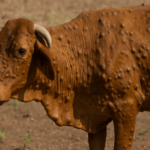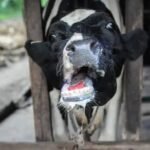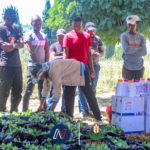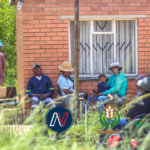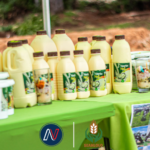By Topollo Tlali
When Masilo Maphutsi first heard the doctor’s advice to reduce sugar intake and opt for honey instead, he had no idea that it would mark the beginning of a life-altering journey.
At that time, he was simply seeking a healthier lifestyle, but when he realised how expensive store-bought honey was, a bold idea began to brew in his mind: Why not rear bees myself?
It was a thought that lingered and nagged at him for almost a year.
Like most new paths in life, it felt daunting. Beekeeping is not the kind of enterprise many in Lesotho naturally gravitate towards.
Unlike crops or livestock, which are familiar forms of farming, apiculture—beekeeping—is still a mystery to most. But Maphutsi was not one to let fear silence potential.
In 2018, he took the first real step. He walked into the Ministry of Agriculture to inquire about what it would take to become a beekeeper. There, he received guidance, technical information, and the confidence to begin.
“That’s when I started, with just one box of bees,” he recalls, his voice calm but laced with pride.
The Humble Hive that Changed Everything
From that first solitary hive, Maphutsi’s passion took root. Like a bee determined to build, he studied bees’ behaviour, their social order, their extraordinary work ethic. His apiary slowly expanded, each new box a milestone not just in production, but in personal growth.
He learned, for instance, that if the queen bee is calm and present, the rest of the hive follows suit.
“I noticed that when I have the queen bee with me, no bee can bite me,” he says, describing the delicate balance of trust and technique required in beekeeping.
“…but not every day was harmonious.
“There were harsh days when the bees stung my sheep. It was hard for me to control them,” he admits.
Managing bees he says is not like managing goats or chickens.
“These are wild yet incredibly intelligent creatures. I had to evolve alongside them, learning patience, precision, and humility,” he recounts.
Despite significant growth, challenges remained.
“I still lack protective overalls and a smoker tool, which are very important for safely collecting bees,” he says.
And although his bees now produce ample honey, he lacks the proper extraction machine and must travel long distances to process his yield. These obstacles would dishearten many, but not Maphutsi.
The Complex Society of Bees—and Lessons for Life
Maphutsi now manages twelve thriving hives, each with roughly two thousand bees.
To him, the hive is more than just a means to an end; it’s a living, breathing society.
“The roles within it—the queen, worker and drone mirror the intricate relationships that hold human communities together, yet here we are talking bees.
“The queen bee, for instance, is not just a figurehead. She can live up to five years and lays over 2,000 eggs a day. Her pheromones keep order in the hive, preventing chaos, rivalry, and collapse. She rarely flies. She stays inside, attended to by the workers. She is the heart of the colony,” the farmer explains.
He adds, “Then there are the worker bees, small but mighty. Their short five- to seven-week lifespan is filled with constant labour; nursing, cleaning, guarding, and eventually, foraging. The drones, on the other hand, live only to mate with the queen. If they fail in this mission, they are expelled and die.”
Maphutsi says he has learned to read these rhythms, to respect the hierarchy and harmony of his hives.
He’s also learned that bees, while fierce protectors, sting only as a last resort—and die after doing so.
“It’s a reminder of the cost of defence, of sacrifice, and of nature’s profound design.”
More Than Just Honey: An Empire of Bee Products
Maphutsi ’s venture—Tumi and Melo Production, formally registered in April 2025—is no longer about honey alone.
Today, his bees yield a treasure trove of natural products: beeswax for skincare, propolis for medicinal use, and even honey wine.
“I don’t only have organic honey. I make wax for vaseline, propolis for flu and other illnesses, and wine,” he says proudly noting these aren’t just by-products.
“They are proof of innovation and the power of value addition in production.”
He describes that the beeswax is used to create natural healing balms, highly sought after in a world turning back to organic remedies.
The propolis, a resinous compound, he says is known for its powerful antibacterial and antiviral properties, while the honey wine—rich, golden, and culturally resonant—adds a new layer of pride and creativity to his brand.
Each product reflects the farmer’s commitment not only to producing but to healing, nourishing, and connecting his community with the gifts of nature.
Yet even as his product line grows, Maphutsi faces daily limitations.
“I sell my products from home. It’s still challenging,” he admits noting without a physical storefront or larger distribution network, his dream of reaching more Basotho remains a work in progress.
Still, he’s undeterred.
“I believe my products can be known countrywide because they are organic and healthy,” he says, with the kind of optimism that only true entrepreneurs carry.
He credits his wife as his unwavering supporter; “Without her, I wouldn’t have come this far.”
The Science of the Hive: Mastering Bee Management
Maphutsi’s success is no accident, he says it is grounded in science and strategy.
His hives are carefully placed in areas that receive early morning sunlight and natural shade during the heat of the day.
“This helps regulate temperature and keeps the bees active but safe,” he explains.
He ensures that nearby floral sources support foraging, even considering planting sunflowers and other bee-friendly crops. In colder months, he explores supplemental feeding methods to maintain hive health.
And when it comes to pests and diseases, the farmers strongly notes he avoids chemical shortcuts.
“I use traditional methods like ash and cinnamon to deter ants and raise hives above ground to prevent infestations. Natural methods keep the bees safe and the honey clean,” he says, reflecting a philosophy of harmony over harm.
“I am also learning advanced techniques like hive splitting and queen breeding to strengthen my colonies,” he explains, adding replacing queens regularly is another future goal, one that will ensure longevity and productivity.
Hygiene, Standards, and Safety
From harvesting to packaging, Maphutsi emphasises hygiene.
He understands that the purity of his products hinges on cleanliness, of the tools, the process, and the people.
“I sterilise my equipment, I wear clean protective clothes, and I keep the processing area clean,” he explains, saying these practices are not just about compliance; they’re about trust.
“Every jar of honey, every block of wax, every drop of wine represents my family name and vision.”
A Vision Rooted in Education and Empowerment
Beyond the commercial side of his business, the farmer is deeply committed to education.
He mentors young people in his village, Sefikeng, Ha Keiso in Teyateyaneng, teaching them about the power of bees and the potential of beekeeping.
“I teach young people to care for bees and how important they are, and how they can change someone’s life,” he says.
In a country where youth unemployment is high and land is often a limiting factor, he says his skills sharing stems from beekeeping as a sector that presents a unique solution.
“It requires minimal land, has low overhead, and produces high-value products.”
Maphutsi believes that by spreading knowledge, he’s not just growing his brand—he’s growing a movement.
The Road Ahead
Today, with Tumi and Melo Production registered, Maphutsi is ready to spread his wings.
“Now that I’m fully registered, I can go anywhere in the country to showcase my products,” he says with a smile saying scaling up means expanding his hive count, securing proper equipment, and reaching new markets.
He’s also seeking partnerships with agricultural agencies, cooperatives, or even supermarkets that can help take his products from village to nation.
His ultimate dream? To see Lesotho become known for its rich, organic honey and to inspire a new generation of beekeepers who don’t just see bees as insects—but as a path to independence.
Masilo’s Legacy: Sweetness Born of Struggle
Maphutsi describes his story as more than a business profile but it’s a testimony. A testimony of how health advice turned into a honey empire, how curiosity birthed a calling, and how, through grit, learning, and the love of bees, he is creating ripples in a sector many still overlook.
(Design a colourful inforgraphic with simple use of bees colours) 🐝 SIDEBAR: Beyond Honey – Amazing Bee Products and Their Benefits
Beekeeping offers more than just sweet rewards. Here are the incredible products bees provide and why they matter:
🍯 Honey:
- Natural sweetener packed with antioxidants.
- Used to soothe sore throats, treat wounds, and boost immunity.
🧴 Beeswax:
- A base for candles, lip balms, lotions, and vaseline.
- Known for its moisturising and healing properties.
🌿 Propolis:
- A resinous substance bees make from tree sap.
- Natural antibiotic and antiviral; helps treat colds, sore throats, and minor infections.
🍷 Honey Wine (Mead):
- Traditional fermented beverage made from honey and water.
- Popular among artisanal drink enthusiasts and cultural markets.
🍬 Pollen & Royal Jelly:
- Superfoods consumed for energy, protein, and vitamins.
- Believed to boost fertility, immunity, and overall vitality.
Bonus Fact: All bee products are 100% natural, making them valuable in both local and international organic markets.
(this one will be positioned on the far side of the article, still with bees colour-theme) 📦 INFO BOX: How to Start Beekeeping in Lesotho
Thinking of becoming a beekeeper? Here’s how to get started:
1. Get Training:
- Visit your nearest Ministry of Agriculture and Ministry of Forestry offices for training and guidelines.
- Attend workshops or shadow experienced beekeepers.
2. Start Small:
Begin with 1–2 bee boxes. You don’t need to buy bees—capture a wild swarm if you have the knowledge.
3. Essential Equipment:
- Bee box (hive)
- Beekeeper’s suit and gloves
- Smoker tool
- Honey extractor (can be rented or borrowed at first)
4. Choose a Good Location:
- Place hives where there are plenty of flowering plants.
- Ensure sunlight in the morning, shade in the afternoon.
5. Register Your Business:
Once you’re ready to sell, register your business to access more markets and government support.
6. Keep Learning:
Join beekeeper associations, attend seasonal trainings, and follow sustainable practices.
“It starts with one box, a bit of courage, and love for nature,” says farmer Masilo Maphutsi.

